
Sales enablement platforms focus on equipping sales teams with real-time tools, content, and analytics designed to enhance selling effectiveness and close deals faster. Learning Management Systems (LMS) primarily provide structured training courses and track employee progress to build foundational knowledge and skills. Explore how integrating a sales enablement platform with an LMS can transform your sales team's performance and training outcomes.
Why it is important
Understanding the difference between a Sales Enablement Platform and a Learning Management System (LMS) is crucial for optimizing sales team performance and training strategies. A Sales Enablement Platform provides tools and content specifically designed to support sales reps in closing deals by delivering real-time resources, analytics, and customer insights. An LMS primarily focuses on structured training, course delivery, and tracking employee learning progress across various topics. Selecting the right system ensures targeted skill development and effective resource utilization that drives revenue growth.
Comparison Table
| Feature | Sales Enablement Platform | Learning Management System (LMS) |
|---|---|---|
| Purpose | Boost sales effectiveness by providing content, training, and analytics | Deliver, track, and manage formal training and education programs |
| Content Focus | Sales collateral, playbooks, product info, customer insights | Courses, certifications, eLearning modules, assessments |
| User Base | Sales teams, account managers, sales leadership | Employees, trainees, HR managers, educators |
| Key Features | Content management, sales analytics, CRM integration, coaching tools | Course creation, progress tracking, quizzes, compliance management |
| Goal | Increase revenue and improve sales conversion rates | Enhance knowledge retention and skill development |
| Integration | Integrated with CRM systems (e.g., Salesforce, HubSpot) | Integrates with HRIS and other training tools |
| Reporting | Sales performance metrics, content usage analytics | Learning progress, completion rates, compliance reports |
| Example Platforms | Seismic, Highspot, Showpad | Moodle, TalentLMS, Cornerstone OnDemand |
Which is better?
Sales enablement platforms focus on providing sales teams with real-time content, tools, and analytics to improve deal conversions, while Learning Management Systems (LMS) primarily offer structured training and onboarding programs. For optimizing sales performance and accelerating revenue growth, sales enablement platforms deliver targeted resources and actionable insights aligned with buyer journeys. LMS solutions excel in foundational knowledge building but lack the dynamic support necessary for immediate sales interactions and pipeline management.
Connection
Sales enablement platforms integrate with Learning Management Systems (LMS) to streamline the training and onboarding processes for sales teams, ensuring consistent knowledge delivery and skill development. By leveraging LMS features such as course management, progress tracking, and certification, sales enablement platforms enhance seller readiness and performance. This connection facilitates targeted content distribution, personalized learning paths, and real-time analytics to optimize sales effectiveness and accelerate revenue growth.
Key Terms
Training Content
Training content in a Learning Management System (LMS) is meticulously structured for comprehensive educational delivery, featuring courses, assessments, and certifications designed to enhance employee skills over time. Sales enablement platforms prioritize dynamic, easily accessible content that supports real-time sales interactions, such as product sheets, case studies, and pitch decks tailored to driving customer engagement and closing deals. Explore more about how these platforms optimize training content to boost organizational performance and sales effectiveness.
Sales Workflow Integration
Sales enablement platforms streamline sales workflow integration by providing tools tailored to content management, training, and real-time sales analytics that directly impact revenue generation. In contrast, Learning Management Systems (LMS) primarily focus on structured educational content delivery and compliance training, often lacking the dynamic integration needed for active sales processes. Explore how choosing the right platform can enhance sales team efficiency and drive measurable business growth.
Performance Analytics
Performance analytics in Learning Management Systems (LMS) provide detailed insights into employee training progress, course completion rates, and skill development effectiveness. Sales enablement platforms enhance these analytics by integrating real-time sales data, tracking content usage, and measuring the impact on revenue and deal velocity. Explore how combining LMS and sales enablement analytics can optimize performance and drive business growth.
Source and External Links
Learning management system - An LMS is a software application for administering, documenting, tracking, reporting, automating, and delivering educational courses and training programs, widely used in higher education and corporate settings to support online and hybrid learning environments.
What is a Learning Management System (LMS)? - An LMS is a web-based software used to plan, deliver, and assess learning with features such as content creation, student monitoring, and interaction tools, utilized by businesses, governments, and schools to improve educational processes.
What is an LMS (Learning Management System)? - LMS platforms help create, deliver, and manage training programs efficiently, offering benefits such as cost reduction, real-time progress tracking, shortened training times, compliance management, and measurement of learning impact on organizational performance.
 dowidth.com
dowidth.com